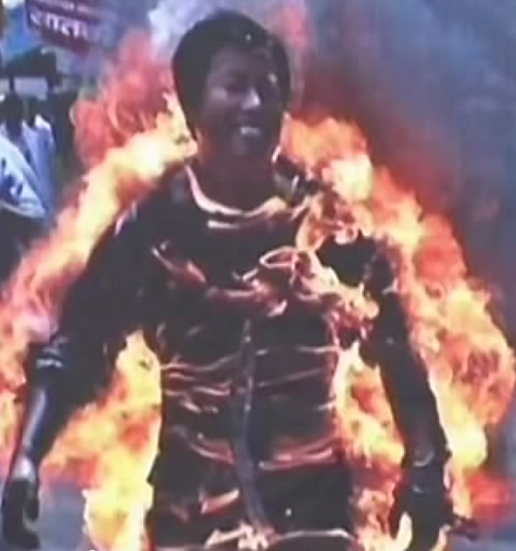China Punishes Relatives of Tibetan Protesters Who Burn Themselves to Death

A county in Sichuan province has issued guidelines aimed at punishing the family members of Tibetans who self-immolate in protest against Chinese rule, the South China Morning Post reports.
According to the guidelines issued by the Ruoergai county, known also by its Tibetan name Dzorge, relatives and partners of Tibetan self-immolators are barred from travelling, running a new business, and obtaining a loan and social security benefits.
Villages or districts where the immolation occur will also face punishment. The respective administrative division have to pay a security deposit of between 10,000 (£986) and 500,000 yuan (£49,337) to the county government, which would only be returned if no further self-immolation occurs.
Monasteries where self-immolations occur will be barred from holding religious activities with outsiders for an unspecified period; the monasteries will also have to pay a penalty of between 10,000 and 50,000 yuan (£986 to £4,933).
Tamdin Kyab, a Tibetan from Dzoege who fled into exile, told Radio Free Asia that the local authorities introduced 16 rules in Dzoege in April last year to contain self-immolations. However the rules were not publicised amid a clampdown on information flow by Chinese authorities, as part of heightened security measures.
A Tibetan man set himself on fire in the Malho Tibetan Autonomous Prefecture on 7 February, and Radio Free Asia reported another case in Qinghai province on February 5.
According to Free Tibet: "Since March 2011, more than 120 people are known to have set themselves on fire inside Tibet in protest against the repressive Chinese occupation of Tibet.
"Self-immolation protests have become less frequent in 2013 but these and other protests are taking place over a widening area of Tibet. Some Tibetans have also set themselves alight outside Tibet and China."
The Tibetan Administration in Dharamsala has urged Tibetans not to take such drastic action, and the US government has called on China to resolve the issue with a resumption of dialogue with the representatives of the Dalai Lama.
Tibet was occupied by Mao Zedong's forces in 1950. The Dalai Lama has been living in exile since a failed rebellion against Beijing rule in 1959.
More than two million Tibetans have been relocated in the Tibet Autonomous Region.
© Copyright IBTimes 2025. All rights reserved.






















